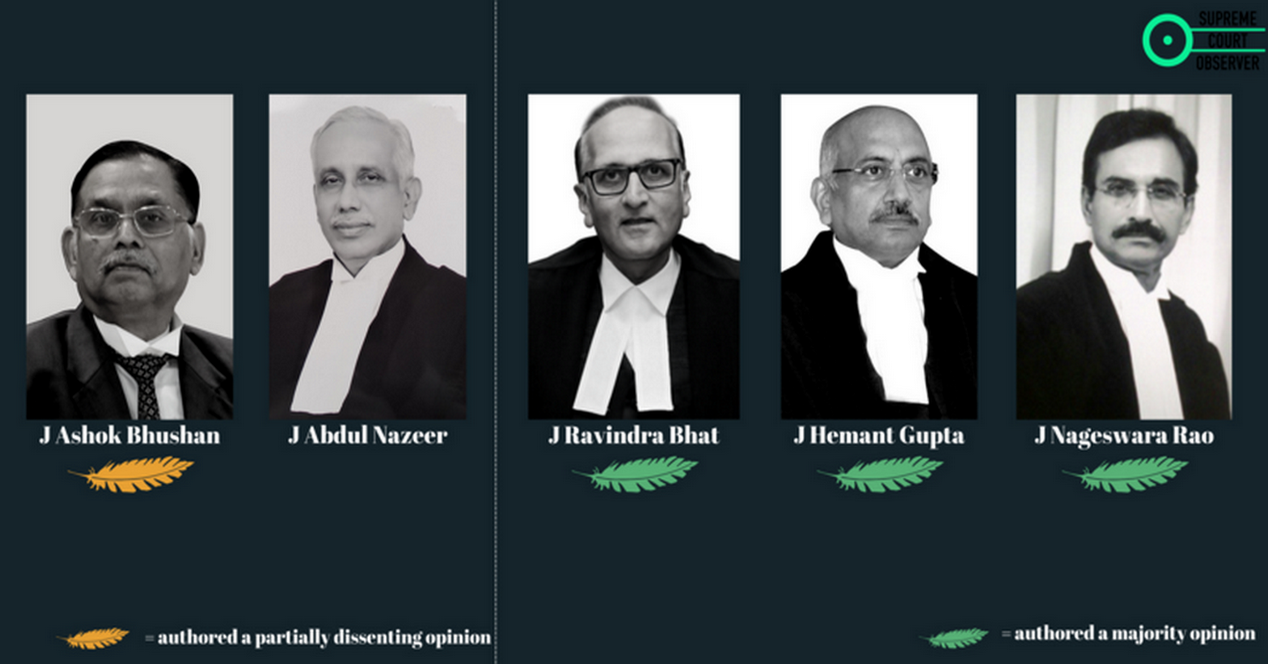Analysis
Justice L.N. Rao’s Notable Judgments: Reservations, Tribunals and COVID Relief
Justice Rao wrote Judgments on a wide range of subjects in his 6 year SC tenure, notably on reservations, tribunal reforms and COVID relief.
Justice L. Nageswara Rao formally retired after a six year tenure at the Supreme Court on June 6th, 2022, while the Court was on summer vacation. His last day of hearings was before the vacation on May 20th 2022.
Rao J was elevated directly from the Bar to the Supreme Court. As a lawyer, Rao J argued a wide variety of cases before various courts. During his judicial tenure, he wrote significant Judgments on an equally wide range of subject matters. Notably, he strengthened the Court’s requirement for empirically sound reservation policies. He left his mark on the perennial tussle between the Executive and Judiciary for control over tribunals and engaged with multiple facets of the COVID-19 crisis.
Constitution Bench Cases on Reservation, Elections and Legislative Process
In March 2021, the Court was still grappling with COVID-19, experimenting with hybrid hearings between the first and second waves of the pandemic. Amidst the flux, a 5-Judge Constitution Bench, a rarity at the Court in recent years, held Maharashtra’s reservations in education and public employment for the Maratha caste to be unconstitutional. Forming the majority along with Justices Hemant Gupta and S.R. Bhat, Rao J’s opinion held that the 102nd Amendment to the Constitution of India, 1950, took away the power of States to identify backward classes for reservations. The Amendment consolidated this power solely in the hands of the Union government. The Union would go on to pass the 105th Amendment to the Constitution in August 2021, restoring State governments’ power to identify backward classes.
This is the only Constitution Bench opinion Rao J authored in his tenure. He was, however, a part of a number of other Constitution Benches in pivotal cases. In 2017, he was part of the majority on the 7-Judge Bench which held that references to both the voter and the candidate’s ‘religion, race, caste, community or language’ during election campaigns is a corrupt practice under Section 123(3) of Representation of the People Act, 1951.
Also in 2017, Rao J, along with four other Judges, held that the repeated re-promulgation of Ordinances, without placing them before the Legislative Assembly, was constitutional fraud. The submission of Ordinances before the Legislative Assembly was a necessary part of democratic procedure—and failing to do so subverted the legislative process.
Rao J Furthered SC’s Push for Data-Backed Reservation Policies
Rao J was part of the 3-Judge Bench constituted in 2021 to clarify the SC’s 2018 Judgment in Jarnail Singh v Lacchmi Narain Gupta, which re-confirmed that the Union and State government must support SC/ST reservation in promotions policies with reliable and up-to-date data. Justice Rao’s decision, delivered on January 28st 2022, refused to specify a criteria for determining inadequate representation of the SC/ST group, leaving it for States to determine themselves. A specific answer from the Court may have ended the delays in implementing the right to promotional reservations, owing to the governments’ confusion with interpreting the data requirements. The uncertainty is likely to linger until the Court reviews each government’s specific criteria.
In the final days of his tenure, Rao J was due to hear reservation appeals arising from multiple High Courts—he would have reviewed the inadequacy criteria of the Union and many State governments. Due to multiple adjournments, these appeals will now be heard by a new Bench after his retirement.
Writing for himself and Justice B.R. Gavai, on March 31st 2022, Rao J held that Tamil Nadu’s reservations policy for the Vanniyar caste was unconstitutional. Vanniyars, classified as a Most Backward Class, were granted internal reservations in public education and employment. The Judgment held that while the Tamil Nadu government was legislatively competent to offer the reservations, it used antiquated data to frame a policy for a politically powerful caste. This discriminates against other Backward Classes—with more benefits afforded to Vanniyars, these groups will be able to avail fewer benefits of affirmative action.
Joining SC-Executive Scuffle for Control Over Tribunal
Entering the Judiciary’s long battle with the Executive for the independence of tribunals, Rao J delivered the majority Judgment in Madras Bar Association v Union of India (2021). He held that modifications to the Finance Act 2017 which reduced the tenure of the chairperson and members of tribunals were unconstitutional. He stressed that the independence of tribunals would be imperilled if their tenure and salaries are subject to the Executive’s decisions.
COVID Judgments
Like the rest of the Court, the COVID-19 pandemic affected Rao J’s tenure substantially—his rate of writing Judgments dropped significantly in 2019. Throughout the pandemic, the Court committed itself to an on-going constitutional supervision of various questions that affected citizens’ heavily altered lives. Rao J, through his Orders, shaped the Court’s engagement with some of these questions.
In June 2021, along with Justices D.Y. Chandrachud and Ravindra Bhatt, Rao J held that the government must utilise the ₹35,000 crores earmarked for COVID management in the Union budget to provide free vaccination to citizens between 18 and 45 years of age. Later, in May 2022, he declared that citizens had a right to bodily autonomy and could not be forced to get vaccinated. However, he noted that the government may impose reasonable restrictions on this right to protect public health.
Rao J engaged extensively with children orphaned during the pandemic. This suo moto case led him to institute another set of suo-moto proceedings—regarding children living in the streets before, during and after the pandemic. At least once a month, Rao J’s Bench adjourned important cases including on reservations and dedicated half a day to superive efforts for their rescue, rehabilitation and education.
In another on-going case, Rao J dealt with the rights of sex workers, ordering the Union and State government to supply them dry ration during the pandemic without insisting on identification proof. Based on a Court-appointed panel’s recommendations, Rao J, in one of his last Orders before retirement, directed the Union and States to implement a slew of directions to protect sex workers from police harassment, medical vulnerabiltiy and imprisonment for doing sex work.



